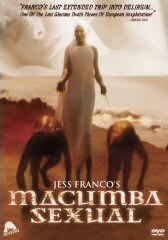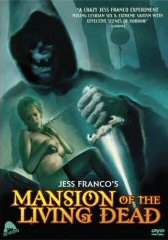An unapologetic violator of taboos, Jess Franco has long been known as a fearless poet of the perverse. As idolized as he is hated, it is difficult to not have a strong opinion regarding both the man and his work. While the mainstream critical establishment often ignores him (indeed, when they even aware of his work), devotees of dark and fantastic cinema regard his movies with awe, wonder, and oftentimes confusion. Love him or hate him (and there are plenty who do both!), one thing you simply can't do with Franco is ignore him. One might as well try and dismiss the violent effects of a tidal wave or some other natural element. For in Franco we have madman and genius, artist and pop icon, a man whose work is his life and vice versa. Little is meaningless in his work, although the meanings aren't always to interpret, and even the more ridiculous elements and occasional failures maintain a strange degree of honesty. Identity. This is what Franco's movies offer a world run rampant with insipid popcorn duplex sequels and tired remakes of movies that weren't so hot the first time around. Identity -- a mark or echo of individuality -- of substance and feeling -- flow like blood and cum (two OTHER Franco staples) in both Macumba Sexual and Mansion of the Living Dead. These two new releases from Severin Films exhibit Franco at his most feverish, using his camera as a caressing hand one moment, a punishing instrument the next. Worlds of nightmare and flesh, Macumba and Mansion offer a tantalizing look into Franco's development, and are clearly the cleanest looking transfers of his films to debut on DVD.

Macumba Sexual features Lina Romay (rollicking in her Candy Coster alter-ego) as Alice Brooks who is vacationing with her boyfriend, enjoying lots of sex at a hotel in the Canary Islands. She finds her life turned upside down as the commonplace dictates of reality are subverted by an enigmatic sexual goddess. Alice suffers feverish dreams of sexual encounters with a tall black woman, who commands a naked man and woman on a leash, treating them like pets. Alice embarks upon a hallucinatory quest to locate this alarming figure. When seeing Princess Tara Obongo (Ajita Wilson). About a business deal, Alice discovers that her host is the "Goddess of Unspeakable Lust" -- the same gal she dreamed about. Before we can shout 'close up!' Franco throws Alice's luxurious world into a delirious dream state of black magic and fantasy. Tara seduces both Alice and her boyfriend, submersing them into her surreal orgies, as Franco uses his chaotic compositions to seduce us into accepting his nightmarish wedding between reality and fantasy at face value.
The colors and images are intensified by Franco's juxtaposed cruelty and eroticism. Opposites are layered on opposites, with contradictions of flesh and mind mirrored by a steamy, off kilter 'reality' that changes with the Princesses' whims. From naked beauties and soft caresses to crude degradation and emotional uncertainty, this is one of Franco's greater visual achievements. While fans of linear, clean-cut story telling will no doubt lament the film's ambiguous, plot-free set up, Franco appears to be more concerned with capturing the fragmented dementia of a dream rather than a traditional narrative. A close cousin to such fare as the superb Succubus, whose very theme of subjective reality is mirrored here, Sexual Macumba operates much like a drama by August Strindberg, subverting realistic expectations for symbolic suggestion. In this it succeeds very well, and an eerie sense of transformation occurs despite a lack of formal storytelling values. Franco suggests more than he 'says' with orgies of color and sound.

The second feature, Mansion of the Living Dead, while more traditional in plot construction, is firmly entrenched in the director's unique visual sensibilities, and depends more on bare skin, color, and traditional supernatural trappings than storytelling conventions. A sexually charged stew of the supernatural and sexual obsession, this ridiculous yet inspired pseudo-Gothic follows the horrible adventures of four sex-craved female friends vacationing in a beachside motel in the Canary Islands. Before we know it, clothes are shed and sex acts performed. Franco's hungry camera devours the masturbatory lesbianism, bondage, and bare ass with renewed energy and flair. It's hard not to be as aroused as the resident handyman as they flounce around the sand nude by day and wild with passion at night. It all isn't sub-bathing and orgies, however, for soon the ladies are set upon by 17th century zombies. Situated in a nearby monastery, these ridiculous zombie-monks want a little grab-ass themselves, and proceed to molest, torture, and murder the girls in enthusiastic if not particularly believable fashion.
Hawked as "an insane homage to the Blind Dead series," this piece of uneven if inspired lunacy is delightful for both what it accomplishes and what it so gloriously fails to do. Franco is at the top of his form spying on his trademark mauling of female flesh, honoring the carnal pleasures of the feminine principle while never straying far from basic exploitation tendencies. The color use, settings, and presences of Eva Leon, Mamie Kaplan, and Lina Romay all conspire to make the film a fetishistic feast. At the same time, Franco's compositions and directorial approach to this admittedly sleazy material somehow approaches true poetry of the senses. Featuring women tied to walls like slavering dogs, sexual shenanigans aplenty, and Monks in K-Mart rubber masks, Mansion is unfettered Franco. This aloe is reason to spend some time with the movie. While nothing here competes with the artistry or ambience prevalent in the Blind Dead series, neither does it try to. Sex, psychosis, and cruelty are the order of the day, with the living dead simply added on as a sub-plot. The two elements work well together as the director flip-flops between fright and filth. You would think that these elements would be marred by ridiculous plot cliché and Ed Wood style FX . . . but you would be wrong. Somehow, ineffectual plot points and zombie makeup even worse than Zombie Lake just lends additional entertainment value to the mess. Franco's sense of 'hey, gang, let's put on a show' frivolity provides an enjoyable counterpoint to the morbid atmosphere, making it a sure cult classic. And, hey, how can a nude Lina Romay be a bad thing . . .?
Renowned and reviled, Franco's work often confuses and irritates even while it strikes a deep emotional chord. This film is no exception, entertaining with over-the-top visual excess, fetish imagery, and nightmarish dream logic. Franco defies the traditional narrative role of the storyteller and becomes a surrealistic painter of celluloid madness and dreamscapes, scattering his amoral vision across beaten, bleeding flesh. Severin is a company to watch if these discs are any indication. They are to be congratulated for both their presentation of these two features. Mansion and Macumba are both examples of Franco unrestrained. After returning to his homeland (Spain) in the early 1980s, he combined his personable approach to filmmaking with a new philosophic complexity and sense of freedom, all of which are discernible here. Never before available on DVD (or, I believe, in English) Severin presents these dark gems in wonderful new transfers, both of which are clean, suffering little grain or dirt. Colors are solid, and both appear in 2.35:1 aspect ratios (anamorphic ally enhanced). Audio is also of exceptionally high quality, with clean mono offered in the original Spanish. Thankfully, optional English subtitles are included.
Extras are short but substantial, with each DVD including a featurette of Franco and Romay interviews. Mansion presents "The Mansion Jess Built," wherein the director spends some 20 minutes ditching Romero's zombie films, speaking on the merits of the Blind Dead, and the feature film. Romay is engaging and candid as she recalls the shoot, her co-stars, and her Candy Coster identity. Macumba is just as extensive, featuring "Voodoo Jess." Here Franco discusses Spain and his return to his homeland, how he made two successive films at the same location, one after another, and of course the movie itself. His good humor and sharpness are evident, while Romay has some interesting things to say about the late Ajita Wilson's transsexualism. In short, these films are essential for the Francophile's collection, and predicts an intriguing future for the company that released them.
Review by William P. Simmons
| Released by Severin Films |
| Region 1 - NTSC |
| Not Rated |
| Extras : |
| see main review |